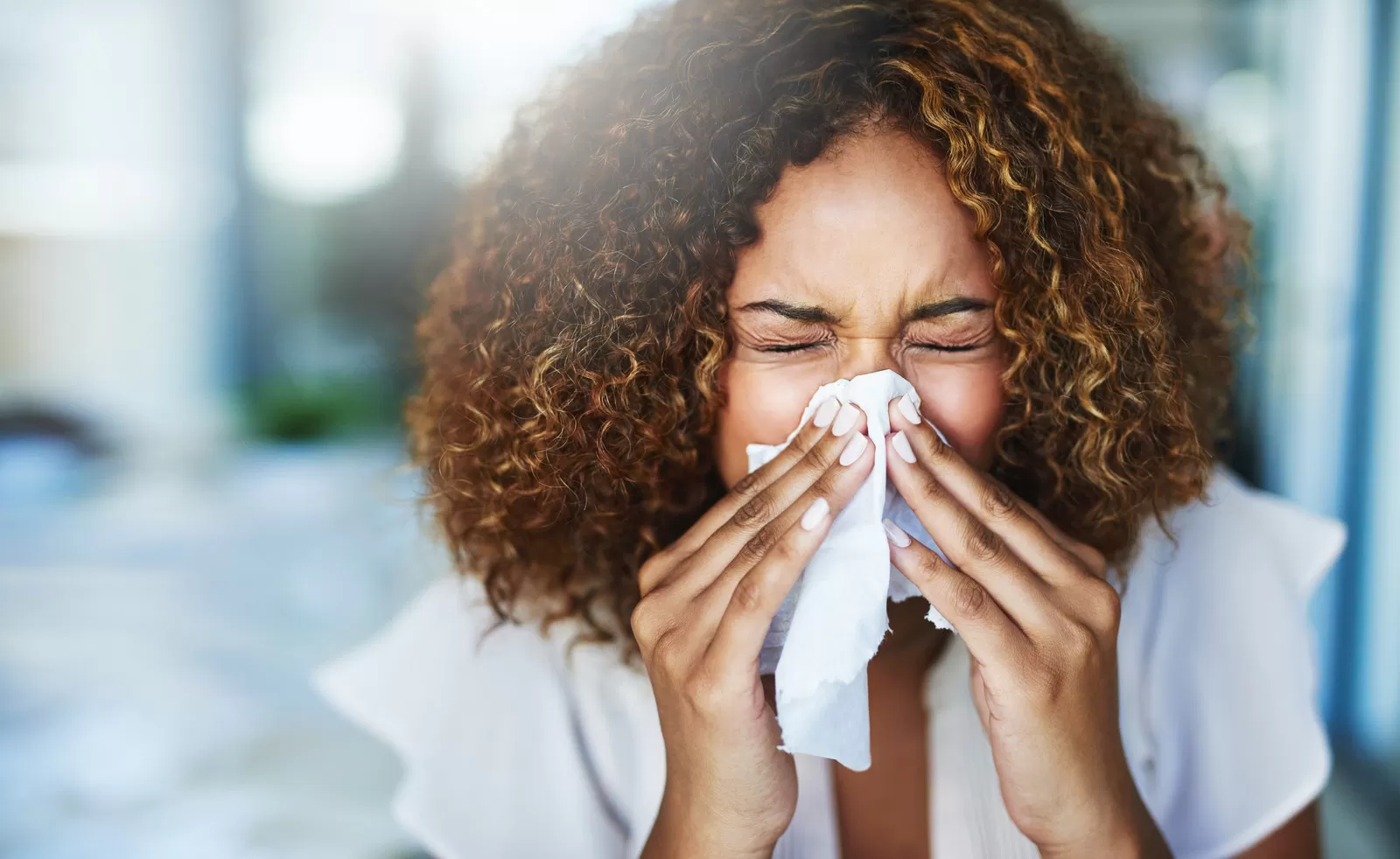Feeling Sick? Use this Symptom Checker for Common Fall and Winter Illnesses

As the weather cools, viruses have a tendency to spread with more ease. That’s because people tend to spend more time indoors, where germs can circulate from one person to another through the air or close contact. This fall or winter, if you find yourself sniffling and sneezing, or experiencing an upset stomach, you could have a common virus.
We’ve created a symptom checker to help you tell the difference between cold and flu symptoms, COVID-19 symptoms and norovirus symptoms. Read on to learn more, and remember to always call your doctor if you have any concerns about your health.
Cold
What is it?
A cold is a respiratory illness caused by different types of viruses, with rhinoviruses being the most common. Colds frequently circulate in winter and spring, but a person can become ill with a cold any time of the year.
What are cold symptoms?
Cold symptoms can be similar to flu symptoms, but they’re generally milder, and usually include the following:
- Runny nose
- Sore throat
- Headache
- Body aches
- Coughing
- Sneezing
How long do cold symptoms last?
Most people recover from a cold within seven to 10 days.
When should you see a doctor about your cold symptoms?
If you experience any of the following, you may want to consider calling a healthcare professional:
- A fever lasting longer than four days, or, in babies younger than three months, a fever that is 100.4 or higher
- Symptoms that lasts 10 days or more with no improvement
- Fever, cough or other symptoms that improve but then return or become more severe
- Dehydration
- Difficulty breathing or rapid breathing
- Chronic health conditions that worsen
- Any other symptoms that cause you concern
Influenza
What is it?
The flu, also known influenza, is a respiratory illness caused by different viruses. The flu can be mild or severe, and even lead to hospitalization or death. Certain groups of people, including young children, pregnant women, older adults and people with underlying health conditions may be at risk for serious complications. An annual flu vaccine can help prevent getting sick. The CDC recommends, with few exceptions, that everyone six months and older get a flu vaccine at the start of every flu season, ideally in September or October.
What are influenza symptoms?
Flu symptoms can be similar to cold symptoms, but they’re generally more severe; they can also be similar to COVID-19 symptoms. Common flu symptoms include:
- Fever
- Sore throat
- Cough
- Headache
- Runny/stuffy nose
- Muscle/body aches
- Fatigue
- Vomiting/diarrhea (more common in children)
How long do influenza symptoms last?
Some people with the flu will recover in a few days, while others may take closer to two weeks. If complications arise, recovery could take longer and require medical assistance.
When should you see a doctor about influenza symptoms?
There are many types of flu symptoms that demand medical attention, and while the following list includes a number of them, it’s not conclusive. Always call your doctor if you’re concerned about a symptom such as:
- Fast breathing/trouble breathing
- Chest pain/pressure
- Severe muscle pain
- Dehydration/not urinating
- Not alert/interaction when awake; confused; dizzy
- Seizures
- Severe weakness
- Fever or cough that improves but then return/worsens
- Chronic medical conditions that worsen
COVID-19
What is COVID-19?
COVID-19, which is a new type of coronavirus, is a respiratory illness that can impact people in different ways, with some people experiencing symptoms similar to the flu. Like the flu, COVID-19 symptoms can range from mild to severe, and older adults and people with underlying health conditions may be at greater risk of developing serious complications.
What are COVID-19 symptoms?
Healthcare professionals are still learning about COVID-19. The following list includes a number of potential symptoms, but not all symptoms. Call your healthcare provider if you think you might have COVID-19 and arrange to get tested.
- Fever/chills
- Cough
- Shortness of breath/difficulty breathing
- Muscle/body aches
- Fatigue
- Headache
- Loss of taste or smell
- Sore throat
- Runny/stuffy nose
- Nausea, vomiting and diarrhea
How long do COVID-19 symptoms last?
Mild cases tend to last one to two weeks, while more severe cases can last six weeks or more, and cause lasting damage.
When should you see a doctor about COVID-19 symptoms?
COVID-19 can lead to serious complications and even death. Call for help immediately if experiencing the following symptoms:
- Difficulty breathing
- Ongoing pain/pressure in the chest
- A sense of confusion
- Trouble staying awake or waking up
- Blue tint to the lips or face
Get the latest information about COVID-19 by exploring our Coronavirus Resources page.
Norovirus
What is norovirus?
Norovirus, sometimes referred to as a stomach bug or stomach flu, is a virus that can spread through contaminated foods and water, or contact with an infected person. It is one of the leading causes of acute gastroenteritis, and is the top cause of foodborne illness. Norovirus can strike at any time of year, but is most common November to April.
What are norovirus symptoms?
If you think you may have the stomach flu or a stomach bug, it could be norovirus. Common symptoms include:
- Vomiting
- Diarrhea
- Stomach pain
- Nausea
Less common symptoms include fever, headache and body aches.
How long do norovirus symptoms last?
A person usually develops symptoms 12 to 48 hours after being exposed to norovirus. Generally, people with norovirus recover in one to three days.
When should you call a doctor about norovirus symptoms?
You should call a doctor if you have any of the following:
- Bloody stool
- Severe vomiting
- Stomach pain
- Dehydration
- Diarrhea that continues after several days
In recent months, COVID-19 has highlighted the importance of frequent handwashing and social distancing to help stop the spread of disease. This fall and winter, remember those lessons, and more: get your flu vaccinations, find ways to manage stress, stay active, prepare food safely and see your healthcare provider for regular exams and screenings. With the proper precautions, you can strive to head into 2021 healthy and ready for a new beginning.
![]()
